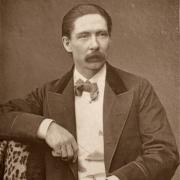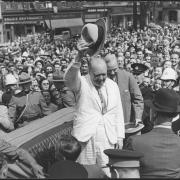Listen. If it’s OK with you, I’m going to start with anecdotes from Sir Tim Rice’s memoirs.
Partly because they’re stories that intrigue/interest/make me laugh.
And partly because he’s about to go on a fab-sounding tour, telling stories that will intrigue/interest/make the audience laugh, interspersed with songs from his shows – though he’s sticking to doing the talking.
*Double-checks press release*
‘You’ll know quite a few of the songs – and will therefore be relieved to hear I won’t be singing them. All musical aspects of the show I hand over to the outstanding Duncan Waugh Band and West End Singers.’
But there’s the rub. I’ve been asked to limit my questions so there are no real show-spoilers. Which, considering the show is entitled, ‘My Life in Musicals – I Know Him So Well’, (and, clearly, I don’t) strikes me as particularly tricky.
*Scratches head while thinking up anodyne questions*
• Do you have hedgehogs in your garden?
• Which has been your favourite pair of shoes to date?
• Do you think the Riemann hypothesis has genuinely been solved?
(Actually, the last one is dodgy. He’s a real numbers man.)
*Scratches out questions*
But – my reasoning goes – these memoir anecdotes are firmly in the public domain and, therefore, fair game.
So, here goes with a few (chosen from many).
• Tim Rice was something of a child prodigy, who could name all 50 US States in under two minutes.
• His parents were tone deaf but literary: Tim’s mum had a string of articles and short stories published, including in Punch and The Times, often using the family as inspiration for humour.
• Tim first introduced himself to Andrew Lloyd Webber via letter, saying, ‘Mr Elliott [a mutual connection] told me that you were looking for a ‘with-it’ writer of lyrics for your songs…’ (I love the ‘with-it’.)
• While working at a solicitor’s office – before fame and fortune took him in a rather different direction – he ripped up the wrong pile of documents, destroying brand new wills and title deeds; for a fortnight, every secretary, clerk and junior (good-naturedly) had to work on the ensuing jigsaw.
• He once passed John Lennon on the stairs at Abbey Road, who ‘spoke to me in what seemed like fluent Spanish’.
• It wasn’t until rehearsals for the Broadway show of Superstar that Yvonne Elliman – who so brilliantly played Mary Magdalene – realised this wasn’t Mary, the mother of Jesus: ‘I’ve always wondered why his mother would have sung that song.’
Anyway. I could go on. But Sir Tim Rice has just appeared on my Zoom screen:
‘I can’t see myself yet. This always happens. I can’t get the video to go… Oh, there you are!’
He looks – from my angle, at least – ridiculously youthful. As if Time has similarly been told, ‘You can interact with him but you can’t, you know, touch on his life’, and meekly agreed.
I want to explain to him why I’m about to ask such odd questions. ‘We’re slightly dodging round anecdotes for the evening,’ I say.
‘I never quite know what anecdotes I’m going to do on any one evening, so… Just fire away – it doesn’t really matter.’
*Interview begins with the sound of me ripping up paper*

LET’S START near the beginning. A very good place to start. (He didn’t write that one.)
It makes me smile when I read about his life, I tell Sir Tim.
‘If someone had written it as fiction, I’m not sure it would be believed,’ I say.
He considers. ‘I don’t know which incidents or episodes you’re particularly referring to…’
Well, I say. Take Joseph, the launch-pad of everything.
The superstar career; the fame and riches; the international acclaim.
The – as it turned out – light-blue-touch-paper-and-retire Joseph and the Amazing Technicolor Dreamcoat. (Ish. Slightly longer story, I know.)
Who’d have thought a musical, written as a favour for kids – world-premiere on Friday, March 1, 1968 at 2.30pm, in the assembly hall of Colet Court School – would lead where it did?
‘Well, we certainly didn’t. And we [he and Andrew] were trying to be Broadway/West End musical writers, and were getting nowhere near it.’
No remuneration offered for writing Joseph; no professional performers; the only possibility of filthy lucre came from an outside chance that some educational music publisher might release it as a modest score. (‘…it was a bit like being offered an outside chance of writing a hit Latin text book.’)
‘We just thought it would be nice to hear some of our work actually performed by other people, rather than by us singing round a piano.’
Fate, however – just like in the Biblical Joseph story – was working on overtime-and-a-half plus days in lieu.
For although that first airing was attended mostly by indulgent mums, the head decided it should be repeated, and this time for dads, too.
‘They couldn’t get out of it when it was performed again on a Friday night. ‘
One of those dads happened to be Derek Jewell, distinguished critic of the Sunday Times. When Tim picked up the weekend paper to see what Derek had made of Cliff Richard at the Talk of the Town, he couldn’t quite believe his eyes. Under ‘Pop Goes Joseph’ was a very decent-length review that included: ‘… it bristles with wonderfully singable tunes. It entertains. It communicates instantly, as all pop should’.
In short, Derek loved it.
The subsequent album wasn’t an instant hit. Andrew still carried on being a student, living at home. Tim kept his job at EMI Records.
‘I was obviously having a reasonably good time enjoying myself writing with Andrew; but all the time I had a backup job. And it wasn’t until Superstar got going that I thought I could take the risk of making this my career.’
(Note to dictionaries: time to rewrite the definition of ‘risk’.)
I’M TRYING to figure something out.
Reading his story, it strikes me how (in a nice way) conventional his early life was. Or, at least, up to a point.
Prep school. Lancing College. Happy childhood with kind parents, and two brothers.
Yet, here he is: a lyricist who can take the most extraordinary, out-of-his-experience characters, and give them an internal life that’s both believable and moving.
Jesus Christ. (Literally, of course.)
Eva Perón
Not only that. But can see into our minds, too. So that when naysayers said, Of course Jesus’s story was too well-known to turn into a stage show! Or that – amusingly conversely – of course Eva’s story was not well-known enough to turn into a stage show! Then Tim knew better.
To be fair, there were interesting (to me in analysis-mode) episodes: such as when his father’s job (very unusually for those days) took the family to Japan for six months in 1955.
Yet not enough to base a whole theory on.

‘Well, I think – and my son pointed this out to me – everything in anyone’s life is guided, or influenced, enormously more by what happened to you when you were at 0-10 than at any other point in your childhood. And I was – I guess, looking back on it – quite lucky in my very early childhood.’
He was born just at the end of the war: a child who found academia a walk in the park. So much so that his mum used to teach him maths ‘just to shut me up’.
Algebra. Angles.
When he got to prep school, he was taken aback to find he was supposed to be learning his two-times table.
He lapped up books, too: Alice, Pooh Bear, Edward Lear, Enid Blyton. The Eagle comic.
Intergenerational books, on the whole that, like his own later lyrics, are loved by all ages.
‘When I was writing for Joseph – and, indeed, much later for the Lion King – I remembered how much I loved things like Edward Lear, which were really quite sophisticated. Or the lovely lyrics of Lewis Carroll in Alice in Wonderland and Through the Looking Glass.’
And though his parents might have been tone deaf, they were big fans of music from the shows. ‘They had a lot of LPs: classical records as well. But they loved Gilbert and Sullivan; Rodgers and Hammerstein...’
Unsurpassed was the day his dad brought back from an American business trip the My Fair Lady album.
In those days, no one really went to the States; the States came over here – Mickey Mouse; the Perry Como show; Westerns. Moreover, not only was My Fair Lady not out yet over here; the BBC was banned from playing it until the UK stage show opened.
Tim’s excitement shot through the roof.
‘Nowadays, if something comes out, it’s worldwide available instantly. Which is fine; but it’s not so exciting. It’s almost over the top.’
So, I can see where his love of musicals originated. Still haven’t worked out how he’s the lyricist he is.
What is his explanation for his wonderful portrayal of women? He from a family of three brothers.
He muses. The solicitor’s office, maybe. Got him observing; got him to realise how interesting differences can be.
‘What I learned most of all was that there are a lot of people in the world who are not like me. There were these wonderful girls in the typing pool, who I often think about to this day; who – and this is not a criticism – were really focused on getting engaged and getting married.
‘I liked them. They were very amusing; very funny; but they all had – well, not all of them – this one common goal.’
SO, WE TALK ABOUT Jesus Christ Superstar.
I’d never really twigged before how daring a musical that was. Although a very different animal, it was a mere three years after Lennon’s ‘observation’ that the Beatles were more popular than Jesus. An observation that resulted in death threats and the public burning of Beatle records.
Yes, Sir Tim says; yet his and Andrew’s was also a record that matched the Zeitgeist.
The mood of spiritualism.
‘Oh, Happy Day by the Edwin Hawkins Singers. Soul Man. And the hippy movement, which was getting going – which we were not part of at all: everybody smoking dope at festivals. This was something that happened to be a background into which our work somehow fitted.’
If they matched the Zeitgeist with Superstar, then Tim invented it with Evita.
‘I first heard of her [Eva Perón] when I collected stamps, aged about nine. I thought she was the queen of Argentina, but I found out that she was just the late president’s wife.’
Years later, after Superstar, when he was a lyricist in search of a story, he heard a radio programme about her, by complete chance.
‘And I thought: that’s the lady on stamps. What a great story.’
Can he think of any UK politicians or their partners who would make the next Evita?
‘At the time, everyone was saying: Where is the musical on Margaret Thatcher? She actually went to the show and wrote an interesting letter to her PA, saying, ‘This is a fascinating study’.
‘I can’t see anybody on the political spectrum, of any party at all, at the moment, who is anything like one percent of the charisma of Eva Perón.’
‘I’VE GOT FIVE MINUTES left – and I could keep you for five days,’ I say to Sir Tim.
‘That’s a test match,’ he points out.
Ah, yes. Haven’t mentioned his deep love of cricket.
Or that he’s written so much stuff people don’t know about: for Freddie Mercury, for grand example. Adapted a hit French musical, Starmania, that few over here are familiar with.
Or Chess. Or Lion King (or, at least, we’ve not said very much about it), for goodness’ sake.
Well, you know. I wouldn’t want to pre-empt the show.
So, I ask, instead, in those final minutes, if he knows the Cotswolds. (He does. His brother owned a pub in Minch, once – he can’t quite remember which. (I think, on Sherlock-Holmes investigation, it might have been the Old Lodge.))
To finish – most important of all – I want to be introduced to his current boxer: dogs he’s loved since the very first, Prinz, the family pet/amazing guard dog when he was a lad.
‘She’s right here. Kirsty! Come on, come on!’
‘Look at you,’ I tell her. ‘You are beautiful.’ And to Sir Tim: ‘She’s saying, ‘Come on, dad! I want to go for a walk.’’
‘Don’t say the word walk!’
As I’m saying thank you for the chat, the Zoom goes blank. My fault not paying for the enhanced package. But we’ve finished the interview. And it was great.
A few moments later, my phone rings. It’s Sir Tim. ‘I just wanted to say sorry that we got cut off like that,’ he says.
I mean, how very kind.
sirtimricelive.com



























